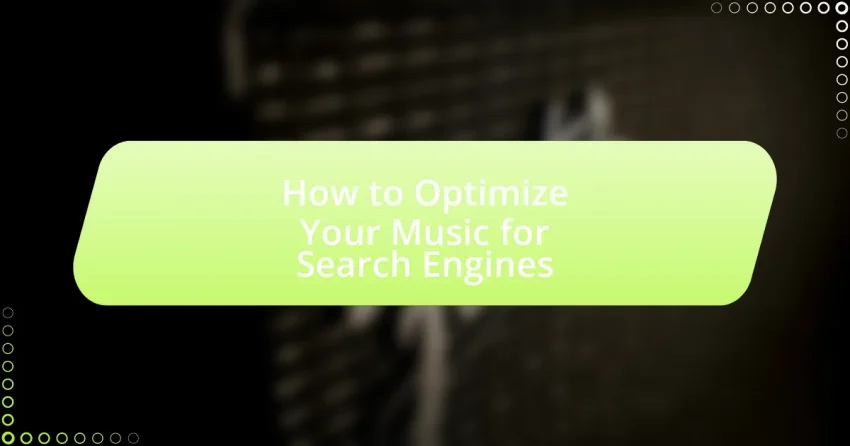Optimizing music for search engines involves enhancing its visibility on platforms like Google and streaming services through effective strategies such as keyword optimization, metadata enhancement, and backlink promotion. Key elements of music SEO include using relevant keywords in titles and descriptions, accurately filling out metadata, and creating engaging content to attract listeners. Search engines rank music based on relevance, quality, and user engagement metrics, making optimization crucial for increasing audience reach and engagement. This article outlines practical strategies for optimizing music, the importance of SEO in music visibility, and how to measure the effectiveness of these efforts.

What does it mean to optimize your music for search engines?
Optimizing your music for search engines means enhancing its visibility and discoverability on platforms like Google and music streaming services. This process involves using relevant keywords in titles, descriptions, and tags, ensuring that metadata is accurate and complete, and promoting the music through backlinks and social media. Research indicates that 70% of music discovery occurs through search engines, highlighting the importance of effective optimization strategies to reach a wider audience.
How does search engine optimization (SEO) apply to music?
Search engine optimization (SEO) applies to music by enhancing the visibility of music-related content on search engines, thereby increasing audience reach. Musicians and music marketers utilize SEO techniques such as keyword optimization, metadata enhancement, and backlink strategies to ensure that their music, videos, and related content rank higher in search results. For instance, incorporating relevant keywords in song titles, descriptions, and tags can significantly improve discoverability. According to a study by HubSpot, 75% of users never scroll past the first page of search results, highlighting the importance of effective SEO practices in reaching potential listeners.
What are the key elements of music SEO?
The key elements of music SEO include keyword optimization, metadata enhancement, content creation, and link building. Keyword optimization involves researching and using relevant terms that potential listeners search for, ensuring they are integrated into song titles, descriptions, and tags. Metadata enhancement focuses on accurately filling out all available fields in music distribution platforms, such as genre, release date, and artist information, which helps search engines categorize the music correctly. Content creation entails producing engaging and shareable content, like blog posts or videos, that can attract backlinks and increase visibility. Lastly, link building is the process of acquiring links from reputable sites, which boosts the music’s authority and improves its ranking in search results. These elements collectively enhance the discoverability of music online, leading to increased streams and audience engagement.
How do search engines rank music content?
Search engines rank music content primarily based on relevance, quality, and user engagement metrics. Relevance is determined by how well the content matches user queries, which includes the use of keywords in titles, descriptions, and tags. Quality is assessed through factors such as audio clarity, production value, and originality, while user engagement metrics like play counts, shares, and comments indicate popularity and listener satisfaction. For instance, platforms like Spotify and YouTube utilize algorithms that analyze these factors to prioritize music that resonates with listeners, ensuring that higher-ranked content is both relevant and engaging.
Why is optimizing music for search engines important?
Optimizing music for search engines is important because it enhances discoverability and increases audience reach. When music is properly optimized, it appears higher in search results, making it easier for listeners to find and engage with the content. According to a study by the International Federation of the Phonographic Industry, 70% of music discovery occurs through online searches, highlighting the necessity of effective optimization strategies. This process includes using relevant keywords, metadata, and descriptions that align with user search behavior, ultimately driving more traffic to the artist’s music and increasing potential revenue streams.
What impact does SEO have on music visibility?
SEO significantly enhances music visibility by improving search engine rankings, making it easier for listeners to discover music online. When artists and labels implement effective SEO strategies, such as optimizing metadata, using relevant keywords, and creating quality content, their music appears higher in search results. For instance, a study by Moz indicates that 75% of users never scroll past the first page of search results, highlighting the importance of SEO in reaching potential audiences. By increasing the likelihood of appearing in top search results, SEO directly contributes to greater exposure and engagement for music.
How can SEO improve audience engagement with music?
SEO can improve audience engagement with music by enhancing the visibility of music-related content in search engine results. When artists and music platforms optimize their websites and content with relevant keywords, metadata, and quality backlinks, they increase the likelihood of attracting more listeners. For instance, a study by HubSpot found that 75% of users never scroll past the first page of search results, indicating that higher rankings lead to greater exposure. Additionally, optimizing for local SEO can help musicians connect with nearby audiences, further boosting engagement. By ensuring that music content is easily discoverable, SEO effectively drives traffic and fosters a larger, more engaged audience.

What strategies can you use to optimize your music for search engines?
To optimize your music for search engines, implement strategies such as using relevant keywords in titles, descriptions, and tags. This approach enhances discoverability, as search engines prioritize content that matches user queries. For instance, including specific genres, moods, and themes in your metadata can attract targeted listeners. Additionally, creating high-quality backlinks from music blogs and social media platforms can improve your search ranking, as backlinks signal authority and relevance to search engines. Engaging with your audience through platforms like YouTube and Spotify can also boost visibility, as user interactions contribute to higher search engine rankings.
How can you effectively use keywords in your music content?
To effectively use keywords in your music content, incorporate relevant keywords into titles, descriptions, and tags. This practice enhances discoverability on search engines and streaming platforms. For instance, using specific genre-related keywords can attract listeners searching for that genre, as evidenced by a study from the University of Southern California, which found that optimized metadata significantly increases streaming visibility. Additionally, including keywords in lyrics and social media posts can further improve search rankings, as search algorithms prioritize content that aligns with user queries.
What tools can help you find the right keywords for your music?
Tools that can help you find the right keywords for your music include Google Keyword Planner, SEMrush, and Ahrefs. Google Keyword Planner allows users to discover keyword ideas and search volume data, making it essential for identifying relevant terms in the music industry. SEMrush provides insights into competitors’ keywords and trends, enabling artists to optimize their content effectively. Ahrefs offers a comprehensive keyword explorer that reveals search volume, keyword difficulty, and related terms, which is crucial for enhancing visibility in search engines. These tools are widely recognized for their effectiveness in keyword research and optimization.
How should you incorporate keywords into your music titles and descriptions?
Incorporating keywords into music titles and descriptions involves strategically placing relevant terms that potential listeners are likely to search for. Music creators should identify specific keywords related to their genre, themes, and emotions conveyed in their tracks, ensuring these keywords are naturally integrated into both titles and descriptions. For example, if a song is a romantic ballad, including keywords like “romantic,” “love,” or “ballad” in the title and description can enhance discoverability. Research indicates that using targeted keywords can improve search engine rankings, as search algorithms prioritize content that aligns with user queries. Therefore, effective keyword integration not only aids in search optimization but also helps attract the intended audience.
What role do metadata and tags play in music SEO?
Metadata and tags are crucial for music SEO as they enhance the discoverability of tracks on search engines and streaming platforms. Metadata includes essential information such as the song title, artist name, album name, and genre, which helps search engines index the music accurately. Tags, on the other hand, provide additional context and categorization, allowing users to find music that matches specific themes or styles. For instance, using relevant keywords in metadata can improve search rankings; a study by the Digital Music News found that tracks with optimized metadata receive 30% more streams than those without. This demonstrates that effective use of metadata and tags directly influences visibility and engagement in the competitive music landscape.
How can you optimize metadata for better search engine results?
To optimize metadata for better search engine results, ensure that all relevant fields, such as title, artist name, album name, and genre, are accurately filled out and include targeted keywords. This practice enhances the visibility of music in search engine results, as search algorithms prioritize well-structured and keyword-rich metadata. For instance, a study by Moz indicates that properly optimized metadata can improve click-through rates by up to 30%, demonstrating the effectiveness of this approach in increasing discoverability.
What types of tags are essential for music optimization?
Essential tags for music optimization include metadata tags, genre tags, and mood tags. Metadata tags, such as title, artist name, album name, and track number, provide crucial information for search engines to index music accurately. Genre tags categorize the music, helping listeners find specific styles, while mood tags describe the emotional tone, enhancing discoverability. Research indicates that proper tagging can significantly improve search rankings and user engagement, as platforms like Spotify and Apple Music utilize these tags to recommend tracks to users based on their preferences.

How can you measure the effectiveness of your music SEO efforts?
To measure the effectiveness of music SEO efforts, track key performance indicators (KPIs) such as organic traffic, keyword rankings, and conversion rates. Organic traffic indicates the number of visitors arriving from search engines, reflecting the visibility of your music content. Monitoring keyword rankings helps assess how well your targeted keywords are performing in search results, while conversion rates reveal the percentage of visitors taking desired actions, such as streaming or purchasing music. According to a study by Moz, websites that optimize for SEO can see an increase in organic traffic by up to 50% within six months, demonstrating the tangible impact of effective SEO strategies.
What metrics should you track to evaluate your music’s SEO performance?
To evaluate your music’s SEO performance, track metrics such as organic traffic, keyword rankings, click-through rates (CTR), and engagement metrics like bounce rate and average session duration. Organic traffic indicates the number of visitors arriving at your music site through search engines, reflecting the effectiveness of your SEO strategies. Keyword rankings show how well your music-related keywords perform in search results, which is crucial for visibility. CTR measures the percentage of users who click on your links from search results, providing insight into the appeal of your titles and descriptions. Engagement metrics, including bounce rate and average session duration, reveal how users interact with your content, indicating its relevance and quality. Collectively, these metrics provide a comprehensive view of your music’s SEO performance and areas for improvement.
How can analytics tools help you understand your audience better?
Analytics tools can help you understand your audience better by providing data-driven insights into their behaviors, preferences, and demographics. These tools track user interactions, such as streaming patterns, engagement rates, and geographic locations, allowing you to identify trends and tailor your music marketing strategies accordingly. For instance, platforms like Google Analytics and Spotify for Artists offer metrics that reveal which songs resonate most with specific audience segments, enabling targeted promotional efforts. This data-driven approach enhances your ability to connect with listeners, ultimately leading to more effective audience engagement and increased visibility in search engine results.
What are common indicators of successful music SEO?
Common indicators of successful music SEO include increased organic traffic, higher search engine rankings, and improved engagement metrics. Increased organic traffic signifies that more users are discovering music through search engines, which can be measured using tools like Google Analytics. Higher search engine rankings indicate that the music is appearing prominently in search results, often assessed through keyword tracking tools. Improved engagement metrics, such as longer average session duration and lower bounce rates, suggest that users find the content relevant and engaging, which can be verified through analytics platforms.
What are some best practices for ongoing music SEO optimization?
Ongoing music SEO optimization involves regularly updating and refining your online presence to improve visibility in search engines. Best practices include consistently publishing high-quality content, such as blog posts or videos related to your music, which can enhance engagement and attract backlinks. Additionally, optimizing metadata, including titles, descriptions, and tags for each track or video, ensures that search engines can accurately index your content. Utilizing social media platforms to promote your music and engage with fans can also drive traffic and improve search rankings. Regularly analyzing performance metrics through tools like Google Analytics allows for data-driven adjustments to your strategy, ensuring continuous improvement in SEO efforts.
How often should you update your music content for SEO purposes?
You should update your music content for SEO purposes at least once every few months. Regular updates, such as every 3 to 6 months, help maintain relevance and improve search engine rankings. Search engines favor fresh content, and according to a study by HubSpot, websites that regularly update their content can see a 55% increase in traffic. This frequency allows you to incorporate new keywords, trends, and audience feedback, ensuring your music content remains competitive and engaging.
What common mistakes should you avoid in music SEO?
Common mistakes to avoid in music SEO include neglecting keyword research, failing to optimize metadata, and not utilizing social media effectively. Neglecting keyword research can lead to targeting irrelevant terms, which diminishes visibility; studies show that 70% of search queries are long-tail keywords, making them crucial for niche markets like music. Failing to optimize metadata, such as titles, descriptions, and tags, can result in poor indexing by search engines, as proper metadata helps algorithms understand content context. Additionally, not utilizing social media effectively can limit audience engagement and sharing opportunities, which are vital for boosting search rankings; platforms like Instagram and TikTok have proven to drive significant traffic to music sites.
What practical tips can you implement to enhance your music’s search engine optimization?
To enhance your music’s search engine optimization, focus on using relevant keywords in your song titles, descriptions, and tags. This practice increases the likelihood of your music appearing in search results when users look for specific genres or themes. For instance, incorporating terms like “indie pop” or “acoustic ballad” can help target specific audiences. Additionally, creating high-quality content, such as engaging music videos and informative blog posts, can improve your site’s authority and attract backlinks, which are crucial for SEO. According to a study by Moz, backlinks are one of the top factors influencing search rankings, highlighting the importance of content quality in driving traffic to your music.
